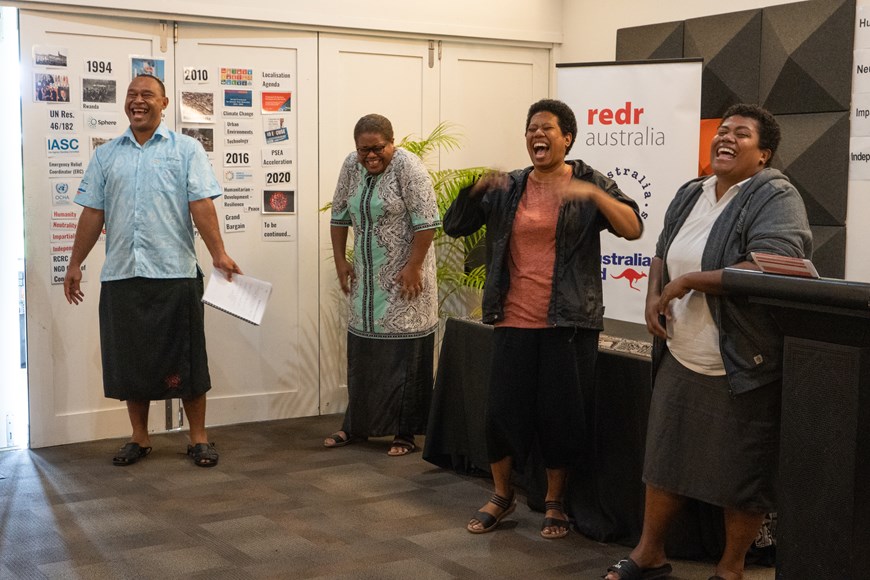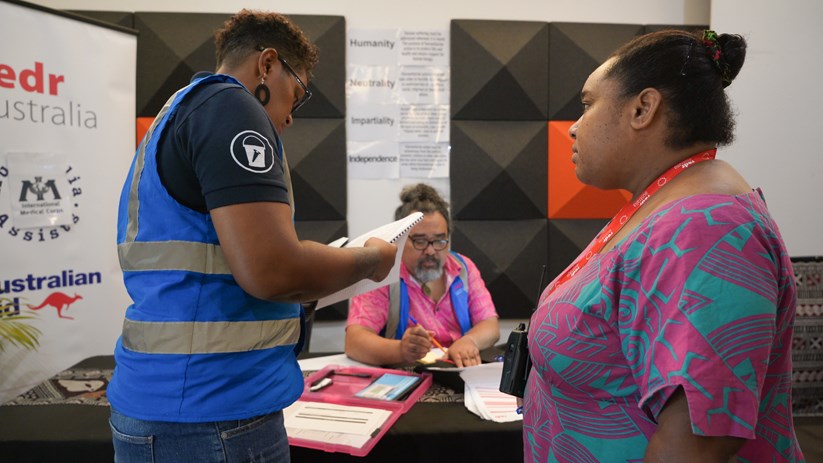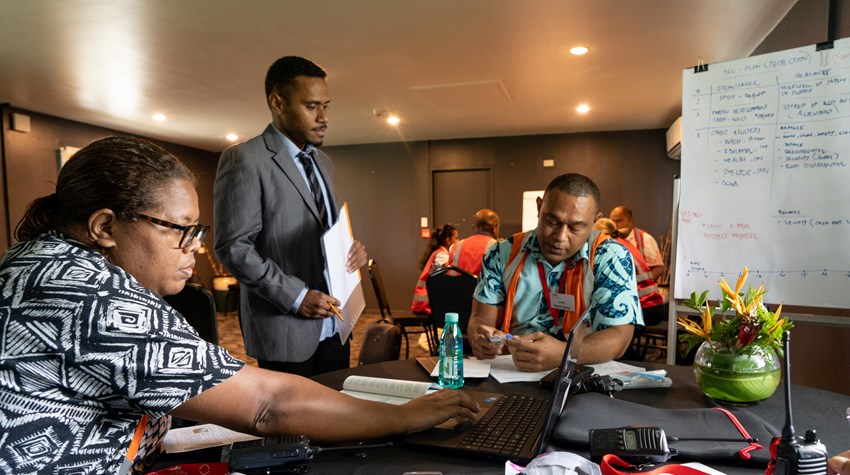As part of our friendship with our Pacific neighbours, Australia Assists, the Australian Government’s humanitarian civilian deployment program implemented by RedR Australia, is providing the region with valuable training in humanitarianism and disaster management.
The Pacific Essentials of Humanitarian Practice (EHP) training course is central to this commitment. Delivered in Fiji, the six-day course immerses participants in an experiential learning environment where they can explore the challenges of the global humanitarian system.
With two booked-out courses already completed this year, and another course scheduled for September filling-up fast, there is strong demand in the Pacific for enhanced humanitarian training. Together, the Australian Government and RedR Australia are planning to start delivering training courses in other Pacific countries from 2023.
Growing local talent in the Pacific
For Pacific communities, climate-related hazards are the single greatest threat to their livelihoods, security and wellbeing. Understandably, there is local demand for training that will help communities to enhance their existing knowledge of humanitarian best-practice.
RedR Australia’s Pacific Regional Manager Jenny Lee says the training will also allow more Pacific Islanders to lend their expertise to partners throughout the region and worldwide, including via deployment through Australia Assists.
“Australia has close friendships in the Pacific and we want to assist our neighbours before, during and after disasters strike,” Jenny said.
“The Australia Assists program is working hard to build respectful partnerships with all our Pacific partners – from regional organisations to United Nations agencies, government partners and non-government organisations (NGOs).
“RedR Australia's Pacific office is based in Suva and implements more than 50 per cent of Australia Assists deployments. We're striving to listen to our partners and assist in areas when requested.”
Skills to enhance the humanitarian sector
The Pacific EHP course attracts participants from a wide range of backgrounds, including staff from the United Nations, international NGOs, government, emergency services, military and university students. The course is suitable for people of all skills and levels of humanitarian experience.
The course gives participants a deeper understanding of humanitarian foundations, coordination mechanisms, and emerging issues and trends.
Completion of the Pacific EHP and Hostile Environment Awareness Training (HEAT) courses are required for full RedR Australia roster membership, which is a prerequisite to deploy with the Australia Assists program. The HEAT course will run in Fiji for the first time in September this year, giving Pacific Islanders more accessible training options with RedR Australia.
Attendees of the first Pacific EHP in 2020 gave the course an overall satisfaction rating of 92 per cent, with United Nations and NGO staff saying the training improved their understanding of the international humanitarian system in the context of disasters as well as the unique challenges facing the Pacific.

Sainiana (far right), a statistician at Fiji’s Ministry of Agriculture, learnt valuable tools to improve coordination in emergencies.
“I am ready to go”
Sainiana Kirisitiana is a statistician at Fiji’s Ministry of Agriculture. She attended the Pacific EHP course in March this year and says the training will benefit not only herself, but the Ministry of Agriculture, the agencies she works with and Fiji as a whole.
“Attending this training is a blessing indeed. It has broadened my knowledge and understanding of humanitarian work,” Sainiana said.
“I am ready to go and share what I’ve learnt with my colleagues as well as my management. When disaster comes, it's all about communicating across the sectors and then sharing the resources. This training will help me to build trust with the people I serve.”

Dr Viliamu Iese (centre) is an expert in disaster risk reduction and is keen to enhance his knowledge of humanitarian best practice.
Amplifying Pacific expertise
Dr Viliamu Iese is an expert in food security and disaster risk reduction. He is Acting Director of the Pacific Centre for Environment and Sustainable Development, at the University of the South Pacific, and he is truly a Pacific citizen. Originally from Samoa, Dr Iese is a citizen of Tuvalu and lives in Suva, Fiji.
As a university researcher and lecturer, Dr Iese saw the Pacific EHP course as a valuable opportunity to update his skills and share his expertise more widely, potentially through deployments with the Australia Assists program.
Speaking about the course, Dr Iese said it’s “not only the chance to learn more about humanitarian actions, standards, laws and protection, but it’s also an opportunity to go out and actually do this work.
“And not only in my own village, my community, my country or countries – but also outside of the Pacific Islands.”
While Dr Iese is experienced in disaster response in the Pacific, he’s keen to expand his knowledge.
“In future, when I’m working in the humanitarian field, I will have a much better understanding and be able to improve effectiveness and efficiency. This is a very good opportunity for me to learn from the experts,” he said.
The next Pacific EHP course will be held at the Nasau Resort, Nadi, Fiji, from 5 to 10 September. Learn more.


